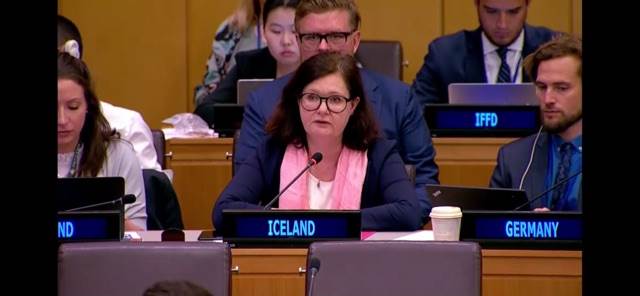Statement by Ambassador Bergdis Ellertsdottir at the UNICEF Executive Board 2019 Annual Session
Thank you Mr./Madam President,
Let me begin by thanking Ms. Henrietta Fore for her introductory remarks and for the thorough presentation of her annual report. Iceland highly values its partnership with UNICEF. You are one of three core UN partners in our newly adopted development cooperation policy and we are not alone in our commitment to UNICEF, with close to 140 governments contributing to the organization last year. We believe your emphasis on leaving no one and no child behind, and to reach the most vulnerable first, contributes to this level of trust.
Another aspect contributing to donors’ confidence in UNICEF is its approach to systems strengthening and multisystem approaches, working horizontally and vertically across sectors and regions. We have seen this firsthand in our collaboration with UNICEF in Mozambique in the WASH sector. While our main goal with this programme is to contribute to the reduction of open defacation and to improve access to safe and sustainable drinking water, other cross-cutting issues have been considered as well. These include nutrition and gender, incorporating a training on the importance of dietary diversity for children in all WASH community outreach and ensuring that school latrines are inclusive and gender sensitive. We imagine it would have certainly been much easier to implement the programme through a siloed approach, but the UNICEF programme staff work with district officials from WASH, education, health and nutrition departments, promoting an integrated approach between these traditionally siloed entities.
It was disheartening to learn that despite more children entering primary school worldwide, nearly 60% of primary-school aged children are failing to meet minimum learning standards. According to the 2019 Financing for Sustainable Development Report, education has indeed become less of a priority for development partners, with the share of education falling from just under 9% of total official development assistance in 2010 to 7% in 2017. We are however pleased to see that 2018 saw a renewed global commitment to children’s education and look forward to UNICEF’s upcoming education strategy. We sincerely hope UNICEF will place increasing importance on quality and early learning in the decade to come. This includes advocating that governments spend a larger proportion of their budget on education and that they prioritize the most marginalized.
Last but not least, we would like to express our appreciation to the dedicated UNICEF staff that often operate in challenging circumstances. You and they can count on Iceland´s continuing support.


